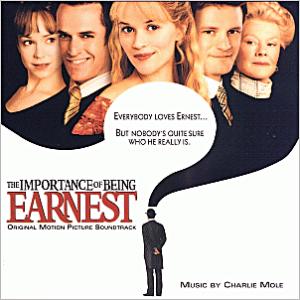************************************************************** RECOMMENDED September 2002 **************************************************************
Charlie MOLE
The Importance of Being Earnest
OST
MILAN 74321 94769 2 [39:38]

Oscar Wilde to jazz? What a delightful notion! For the greater percentage of this disc, the notion holds out beautifully and appropriately comically. With a little editing the bopping score can be made to last a good 35 minutes, flowing breezily into itself and recalling that time when musically and filmically – 'Anything Goes'. What needs editing is the midway placement of the song "The Serenade (Lady Come Down)". Although still with Mole's music and based upon Wilde's poems, the vocals by Rupert Everett and Colin Firth jar the mood somewhat. Had they both been sequenced last, where the jokey reprise is, there would be no problem.
This minor issue aside, it's quite lovely to hear a jazzy ensemble employed so consistently throughout a soundtrack score. A particular highlight, which takes a slight stylistic detour is "Perfectly Heartless", with a lively guitar solo from Mitch Dalton. Equally noteworthy are the solo spots for violin ("Cecily's Fantasy") and trumpet ("Ernest After All"). So all in all, this is a highly recommended release for anyone who might passingly assume Wilde = precious period music.
Paul Tonks

But Gary S. Dalkin is more impressed
Following Othello (1995) and An Ideal Husband (1999), The Importance of Being Earnest is the third feature collaboration between composer Charlie Mole and director Oliver Parker, and their second successive Oscar Wilde adaptation. Although the late Victorian setting of the play has been retained for the film the score covers several decades of jazz styles from the 1920s to 1960's. Being composed it is not, as Elmer Bernstein has noted regarding his score for The Man With The Golden Arm (1955), jazz, but music which employs the sounds, instruments and idioms of the genre. Although anachronistic, the distinctly 20th century jazz sensibility seems appropriate to the spirit of Wilde, a man whose knowingness and sardonic humour places him decades ahead of his time.
Using a small orchestra plus piano, guitars, bass, drums, vibes, percussion, and with the composer on organ, the first thing which must be said about this disc is that the sound is simply superlative. Detail levels are truly remarkable, the stereo imaging is extraordinarily precise with particular percussion instruments being very accurately defined across a wide soundstage. The bass is as powerful as I have heard from acoustic instruments, providing a very solid foundation for some intricate and multi-layered arrangements.
The main theme, first heard in the title cue, is a wonderfully catchy affair with real propulsive drive and a sprightly sense of urgent optimism. It recurs through the score in a variety of guises, wearing the colours of various styles of jazz and capturing moods from wittily oblique to tender-hearted. The immensely varied yet surprisingly cohesive music covers everything from big band to tea dance, the cakewalk to ragtime, even taking in a pastiche Turkish flavour for the opening and closing of "Perfectly Heartless", with a pin sharp guitar solo from Mitch Dalton. The addition of electric organ brings the sound into more recent decades while several cues suggest the melancholy of 1960's John Barry though with more complex arrangements than Barry would explore.
Also included are two versions of "Lady Come Down", a duet for Rupert Everett and Colin Firth setting Wilde's poem "Serenade (For Music)". The first version is brief and to the point, the second, which closes the disc, much more playful and tongue-in-cheek. It's certainly a fun way to end the album, though neither actor should give up the day job.
A disc which at just under 40 minutes neither short changes nor outstays its welcome, Charlie Mole's album is infectiously cheerful, romantically old-fashioned and yet blithely post-modern in its gleeful borrowings from a variety of genres from light music to swing. It is lovingly performed feel-good music in the best possible sense - you can just hear the musicians having a great time in the studio - and with absolutely fabulous sound can not fail to put a smile on the most miserable face.
Gary S. Dalkin

Return to Index